
ACCESS NX - The Future of IP Audio Transmission
Since ACCESS was introduced over a decade ago, it has become the world’s leading IP audio codec and in that time, IP transmission technology has developed significantly. Comrex has taken its our world-class platform, along with the last decade of technical growth and built a brand new platform for the future – ACCESS NX.
ACCESS-NX is the latest incarnation of the industry-standard ACCESS-IP from Comrex and provides a step-change in stability and resilience in IP audio codecs.
Equipped with a 5-inch capacitive touch screen and improved user interface, ACCESS-NX is simple to operate in the field. It has 2x Mic/Line switchable inputs plus a stereo tape input plus there is an optional add-on 4-channel mixer making 6x users in all.
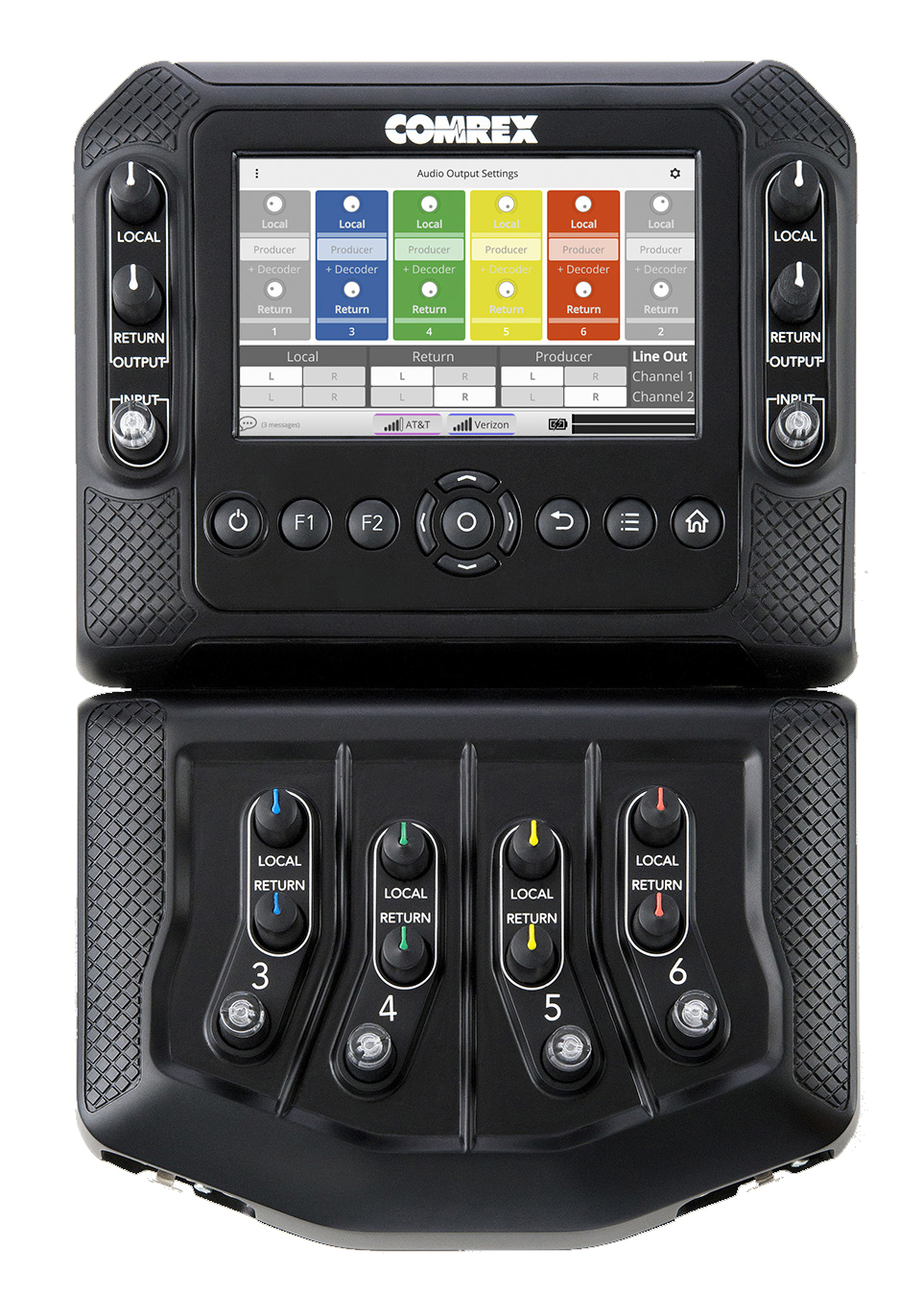
IP Networks
IP infrastructure is growing rapidly, and networks are available virtually everywhere. ACCESS NX offers several ways to get connected. Developed from the ground up for use over the public internet, with 2-way, stable, stereo, low-delay audio over pretty much any type of internet connection including wireless systems such as WiFi, 4G and 3G. For those who need to use public Wi-Fi, ACCESS NX can log in to IP networks through the integrated web browser. This allows users to type credentials into login screens and agree to usage terms, which expands networking options.
Still need to use POTS? ACCESS NX is compatible with a USB POTS/PSTN modem for use on legacy analog phone lines*.
*USB modem sold separately
CrossLock Technology
ACCESS-NX uses the latest generation of digital processing to provide multi-streaming high-quality stereo audio using CrossLock that creates a Virtual Private Network (VPN) between codec devices. This VPN can have its own rules about when to resend packets and it can do it in a much smarter way by building extra data streams between the codecs that relay important information (e.g. decoder statistics back to the encoder).
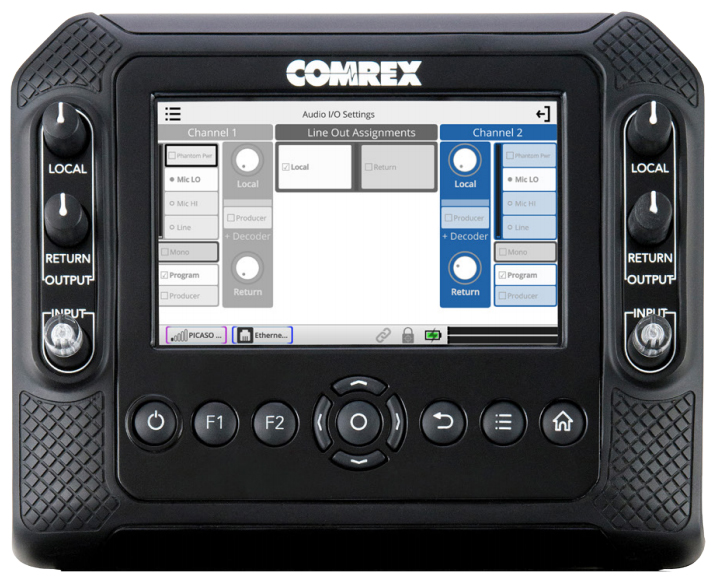
Broadcast Reliable Internet Codec Technology
ACCESS-NX uses BRIC technology (Broadcast Reliable Internet Codec) to deliver wideband audio over the public internet and other IP networks in real-time. It includes Opus algorithms as well as AAC from Fraunhofer IIS - including the remarkable AAC-ELD - both of which provide near-transparent audio transmission, as well as G722 and G711 that provide additional compatibility with other manufacturers' hardware and Voice-over IP (VoIP). There is also a built-in linear uncompressed mode (PCM) and FLAC lossless audio coding, suitable for managed networks with a high Quality-of-Service (QoS). Because the ACCESS-NX constantly adapts to changing network conditions, audio delay is kept to a minimum whilst maintaining audio stability.
User Experience
Equipped with a 5-inch capacitive touch screen, it’s simple to operate ACCESS-NX in the field. Plus, with an improved user interface, ACCESS-NX is designed to be even more user-friendly than its predecessor.
Studio Codecs
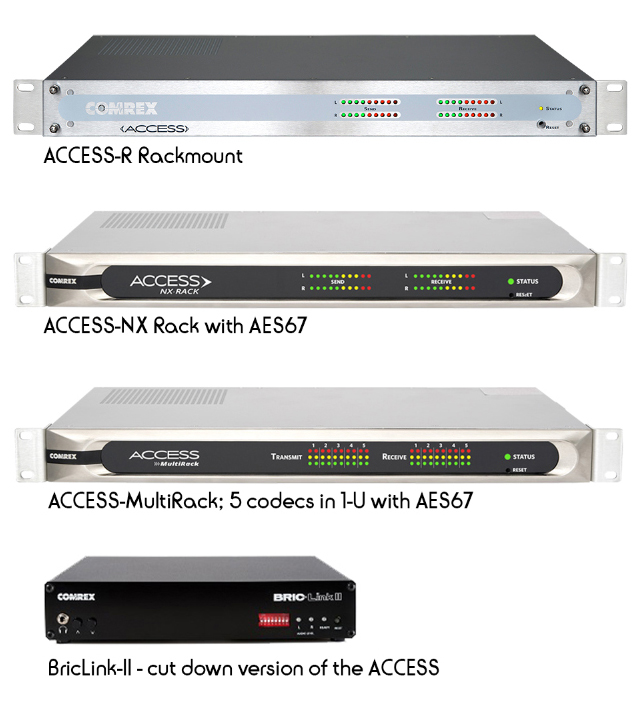
ACCESS-R is the industry standard IP Audio Studio Codec with wide compatibility including N/ACIP SIP-EBU-3326 compliance. It is a platform for CrossLock which is the "reliability layer" that makes it all work and provides balanced stereo analogue and AES-EBU digital audio in-and-out.
ACCESS-NX Rack has the same capabilities as the ACCESS-R and features a new, user-friendly, web-based interface. It also provides AES67 in addition to AES3 and analogue audio.
ACCESS MultiRack has five full-duplex ACCESS audio codecs in a single rack unit. Perfect for large operations, ACCESS-MultiRack allows simultaneous connections to ACCESS Portables (Classic, 2USB and NX), ACCESS Racks (Classic and NX), BRIC-Link (Classic and -II) and software codes including CallMe and FieldTap.
BricLink-II is a cut-down version of the ACCESS, still providing all the clever forward error correction and error masking, multi-streaming and CrossLock. It does not have the full list of coding algorithms but includes G.772 and Opus. Two BricLinks can be mounted side-by-side in 1-U.
NX-R ACCESS-Rack
While the ACCESS-NX has been optimized to provide complete mobility and solid reliability, the ACCESS Rack has been designed as its perfect studio counterpart. The ACCESS-R rackmount is a 1U unit with analogue stereo audio inputs and outputs plus digital AES on XLRs. There are also serial and GPI ports which can be sent alongside the audio to the connected unit. A standard phone line connection and Contact Closure completes the rear panel. ACCESS Rack can be directly controlled with a keyboard or mouse, a USB touch screen monitor, or driven with a standard web browser.
The front panel shows only send and receive audio levels plus network status whilst all setup and connection functions, as well as detailed status, audio levels and network statistics are accessed through the user-friendly web interface. Operation is as simple as selecting a remote unit from the 'address book' and clicking Connect, while advanced configuration menus are available for power users who wish to configure all aspects of the audio coding process.

Optional Road / Flight Cases
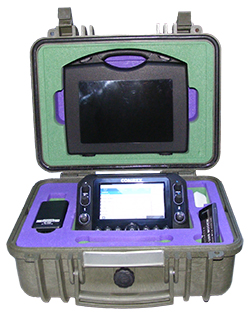
NX-ROAD-EX – For ACCESS-NX and Accessories
Olive Green waterproof Explorer case made from high impact poly-ethylene and rugged enough for even the most severe and hazardous environments, fitted with high-density foam to take the ACCESS-NX, 1 battery and 1 spare, mains power supply, USB WiFi adapter, POTS modem and 4G / 3G dongle, with ancillary cables and manual held in a removable ABS case held in the lid.
Overall dimensions are 360 x 305 x 195mm approx (W x D x H) and the weight is 2.75kg (empty) or approximately 8.5kg with equipment. There are two snap-shut catches to close the lid and the moulding incorporates provision for a padlock.
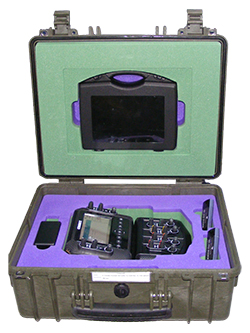
NX-ROAD-MX – For ACCESS-NX With Its Mixer and Accessories
Silver-grey Comrex high impact ridged plastic case with aluminium frame and sturdy fasteners, rugged enough for the cargo hold of an aeroplane. Custom foam for the ACCESS-NX accommodates the ACCESS-NX with 1 battery and 1 spare, USB WiFi adapter, POTS modem and 4G / 3G dongle, mains power supply, cables and headphones etc. A pre-cut area of foam can be easily removed to accommodate the AX-MIX add-on mixer. With the cover closed, there is space for manual and other items between the foam.
Overall dimensions are 485 x 375 x 215 mm approx (W x D x H) and the weight is 12.5kg (empty) or approximately 18.5kg with equipment. There are two wind-down catches to close the lid and provision for a padlock.
Data Packages – Unlocked 4G / 3G Dongles and Paid-up Data Bundles
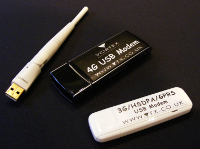
For the ACCESS to connect via 4G / 3G (UMTS), a suitable plug-in USB modem 'dongle' needs to be used. We have a lot of experience with mobile connectivity and are happy to share this information with customers.
In most situations, it is possible to choose a data network that will provide suitable performance in a particular geographical area but it can be very convenient to be able to use a different network from time to time. This is particularly important when roaming, where data charges can be extremely high, and when away from base where another network may provide better coverage.
Comrex Connect Professional Grade Modem
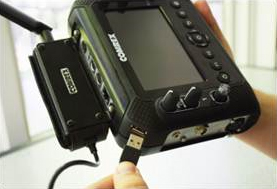
Comrex Connect has arrived and comes in both LiveShot and Access configurations. Connect is a pro-grade, high performance cellular data modem that ensures the highest degree of broadcast reliable data transmission. Each devices comes in a ruggedised, industrial case with a carrier-certified, high gain antenna (2.1dBi) and sturdy, customised mounting hardware for either the LiveShot or ACCESS-NX codecs.
The ACCESS runs under Linux and whilst most USB dongles will have Windows drivers available, Linux support is less certain. We therefore stock unlocked modems that we know work reliably with the ACCESS and provide high quality connectivity.
We are also able to provide paid-up data packages (for example a year's data connectivity on a specific network) and other data contracts in conjunction with our modems (depending on network / geographical location). We have a good deal of experience in using various networks around the world so please contact us if you have any specific requirements.
If you wish to use an existing 4G or 3G modem with the ACCESS, you may find it useful to consult Comrex's list of supported devices. While many other devices will work, these have been verified and are therefore recommended: Recommended modems for Comrex Access Codecs
ACCESS Algorithms
The ACCESS codec includes the following algorithms as standard:
| Algorithm | Audio Bandwidth | Data Bitrate | Coding Delay |
|---|---|---|---|
| HE-AAC | 20kHz mono | 32kbit/s | 600ms |
| 20kHz stereo | 48kbit/s | 600ms | |
| 20kHz dual mono | 64kbit/s | 600ms | |
| HEv2-AAC | 20kHz | 18-48kbit/s | 300ms |
| AAC | 20kHz | 64-256kbit/s | 300ms |
| AAC-LD | 20kHz mono | 64kbit/s | 80ms |
| 20kHz stereo | 96kbit/s | 80ms | |
| 20kHz dual mono | 128kbit/s | 80ms | |
| AAC-ELD | 20kHz | 24-96kbit/s | 50ms |
| Linear uncompressed | 20kHz mono | 788kbit/s | 40ms |
| 20kHz stereo | 1536kbit/s | 40ms | |
| FLAC | 20kHz mono | ~540kbit/s* | 26ms |
| 20kHz dual mono | ~1080kbit/s* | 26ms | |
| 15kHz mono | ~360kbit/s* | 26ms | |
| 15kHz dual mono | ~720kbit/s* | 26ms | |
| G.711 µ-law & a-law | 300Hz-3.4kHz mono | 64kbit/s | 80ms |
| G.722 | 7kHz Mono | 64kbit/s | 80ms |
| OPUS | Mono 48kbps | 48kb/s | 41ms |
| Mono 56kbps | 56kb/s | 41ms | |
| Mono 64kbps | 64kb/s | 41ms | |
| Stereo 64kbps | 64kb/s | 41ms | |
| Stereo 96kbps | 96kb/s | 41ms | |
| Stereo 128kbps | 128kb/s | 41ms | |
| CBR Mono 48kbps | 48kb/s | 41ms | |
| CBR Mono 64kbps | 64kb/s | 41ms | |
| CBR Stereo 64kbps | 64kb/s | 41ms | |
| CBR Stereo 96kbps | 96kb/s | 41ms | |
| CBR Stereo 128kbps | 128kb/s | 41ms | |
| *FLAC bandwidth is variable and based on audio input | |||
AAC
Provides near transparent audio at a range of data rates. AAC has been extensively tested by critical listening studies and has been judged to be virtually indistinguishable from the original audio.
HE-AAC
Enhances the AAC standard by adding Spectral Band Replication. This is a way of delivering equivalent performance to AAC at lower rates. SBR is applied to high frequencies of audio, while normal AAC is applied to the lower frequencies. This is the standardized version of what has been known in the industry as aacPlus.
HE-AACv2
Enhances the HE-AAC standard by adding a special form of parametric stereo coding to further reduce data rates.
AAC-LD
Requires higher data rates but provides near transparent voice and music with low delay.
AAC-ELD
Combines the best aspects of low-delay audio coding with Spectral Band Replication to reduce bitrate. This combination creates a coding algorithm that is uniquely suited to real-time IP transmission. Using AAC-ELD with ACCESS allows full-fidelity high quality audio transmission at a data rate that easily fits into satellite and 3G wireless upload channels. One way ACCESS transmission delay using AAC-ELD is an easily-managed 50 milliseconds.
Linear PCM
Does not compress audio at all and uses 48kHz sampling to provide low-delay transparent audio but with large data throughput. Mono mode requires a network capacity of 804kb/s whilst stereo (dual mono) requires in excess of 1.5Mb/s.
FLAC
Compresses the audio data using a low-delay loss-less algorithm that usually removes some 30-40% of the network data compared with PCM, without introducing any coding artefacts. The actual data rate is variable based on the complexity of the coded audio.
G.711 – µ-law & a-law
The coding algorithms used by standard digital POTS/PSTN calls, providing normal "telephone quality" 300Hz-3.4kHz audio. These algorithms are included for compatibility with SIP-style VoIP 'phones and codecs.
G.722
The coding algorithm traditionally used by broadcasters over ISDN for sport and news commentaries and providing 7kHz low-delay speech and music. This algorithm is also included for compatibility with SIP-style VoIP 'phones and codecs.
Opus
A new flexible audio format that is taking Audio over IP by storm, ACCESS units on update 3.0 or higher receive support for this format. Opus is a low delay, low bitrate and high quality audio codec. This audio format is utilised by our CallMe Internet Codec Service, which links smartphones, tablets and computers to your studio codec.
| Specifications | |||||||||
|---|---|---|---|---|---|---|---|---|---|
| Audio Connections |
|
||||||||
| Other Connections |
|
||||||||
| Add-on Mixer |
|
||||||||
| Power |
|
||||||||
| Operation |
|
||||||||
| Physical |
|
||||||||
Manuals: NX Operations Manual - ACCESS Modems





